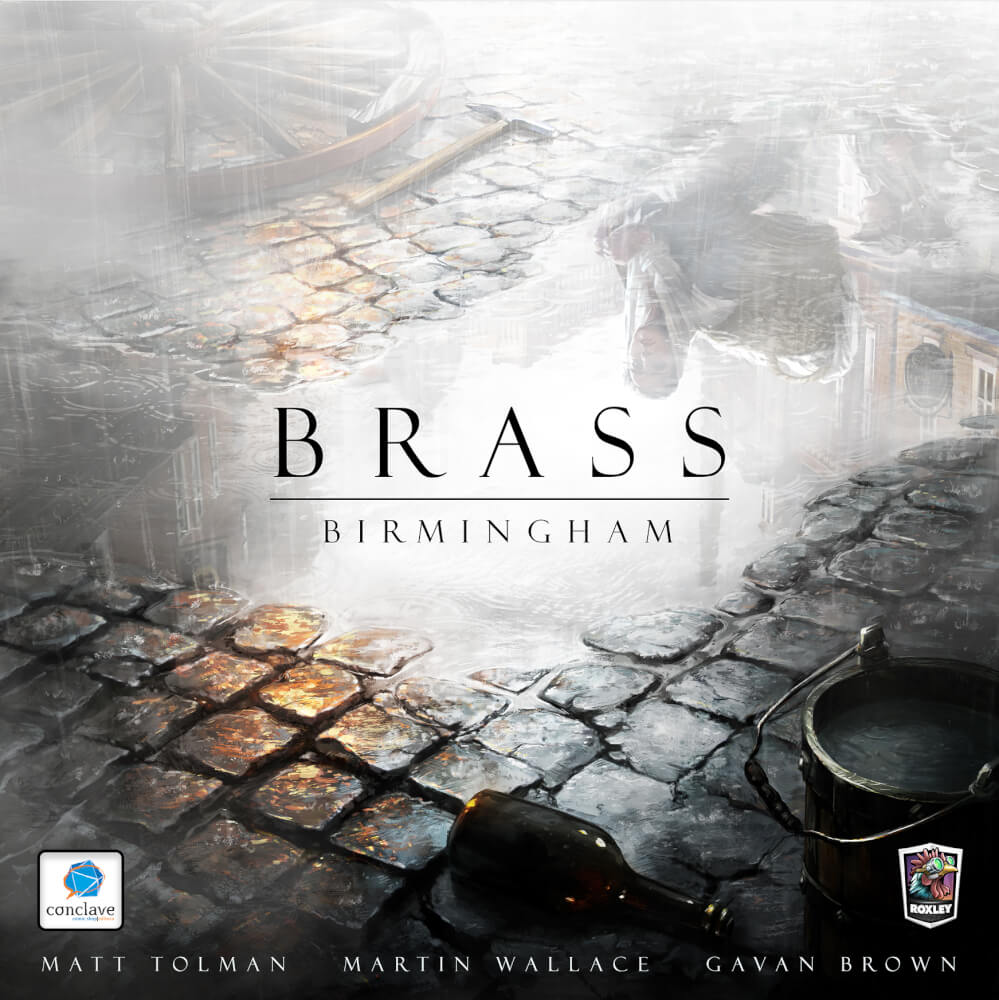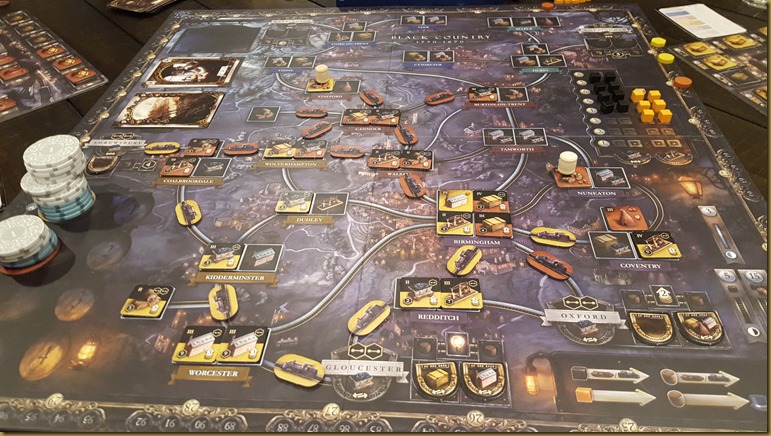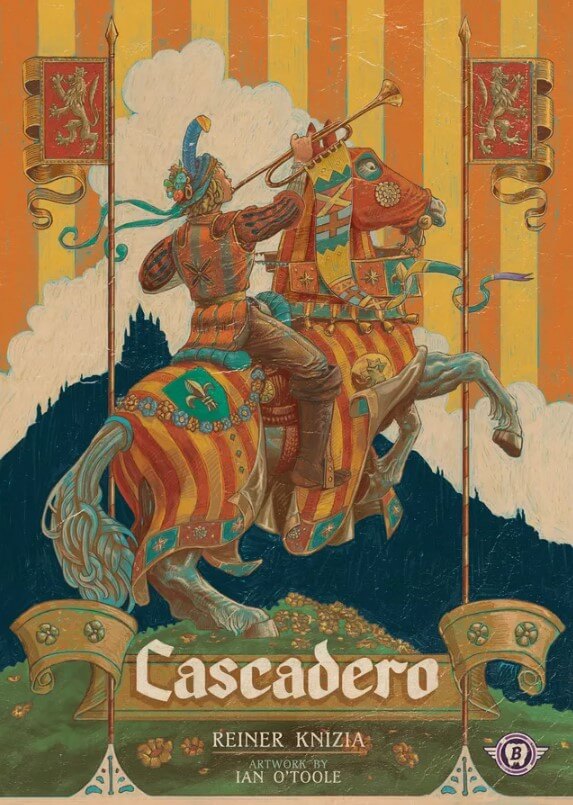
Brass: Birmingham
Brass: Birmingham is an economic and strategy board game, designed by Martin Wallace and released in 2018, which expands on the dynamics of its predecessor, Brass. Set in the city of Birmingham during the industrial revolution, between 1770 and 1870, players take on the role of entrepreneurs in search of prosperity in an ever-changing market. In Brass: Birmingham, your mission is to develop industries, build rail networks and establish trade connections, always attentive to fluctuations in demand for products. The game features five main actions: build, develop, create a rail network, sell and take out a loan, as well as the new explore action, which allows you to discard cards to acquire a lease or industry wild card.With engaging mechanics and demanding strategic thinking, Brass: Birmingham is a challenge for those looking for a deep and captivating game, balancing risks and rewards in every decision. It's ideal for those who enjoy well-crafted tactics and fierce competition in the context of the industrial revolution. Complexity: 3.9 / 5 (BGG 20/03/2023)Artists: Lina Cossette; David Forest
Designers: Gavan Brown; Matt Tolman
Date: 2018
Note: 9
Mechanics: Trees / Technology Trails, Building Networks and Routes, Loans, Hand Management, Market, Shift Order: Based on Statistics, Income
Topics: Economy / Production, Transport
Table of Contents
- How to Play
- Tips for playing
- Game mechanics
- Game components
- Additional Information
OBJECTIVE OF THE GAME

Tips for playing
Here are some tips for doing better in the game Brass: Birmingham:
- Prioritize the construction of canals and trails in the appropriate phases.
- Make the most of the beer, coal and iron industries, they are essential.
- Pay attention to market demand and prices to optimize your sales.
- Keep a balance between expanding your networks and developing industries.
- Use loans strategically to leverage your investments.
- Keep a close eye on your opponents' actions to avoid strategic blocks.
- Focus on improving your cards to increase your tactical options.
Video about the game
GAME mechanics
- Building Networks and Routes: In "Brass: Birmingham", players build routes between different locations represented on the board, connecting cities with canals and railroads. This mechanic is crucial for connecting industries and markets, allowing the movement of goods and facilitating trade between distant locations. The connectivity of networks directly influences the ability to sell goods and the expansion of players across the board.
- Hand Management: Players start each round with a set of cards representing cities or types of industry. This card management system requires strategic decisions about when and where to use specific cards to build, develop or carry out business actions. In addition, the use of cards is vital for planning the future growth of your industries and networks.
- Loans: To finance their operations, players can take out loans at any time during their turn. In doing so, they receive a fixed amount of money, but also reduce their future income by advancing their income indicator a predetermined amount of spaces backwards. This mechanic allows players to obtain necessary funds at critical stages of the game, but requires careful planning so as not to jeopardize long-term income.
- Market: The game has a market for coal and iron, where prices will fluctuate depending on supply and demand. Players must buy or sell these commodities in order to build industries or use expansion skills. Keeping an eye on the market is essential to maximize profits and minimize costs, as the availability and price of these resources directly impact the ability to build and develop infrastructure.
- Shift order: Based on statistics: The order of turns in "Brass: Birmingham" is determined by the amount of money spent in the previous turn. The player who spent the least plays first in the next round. This offers a strategic element, as spending wisely can guarantee opportunities for advantageous actions at the start of the next turn.
- Income: Income is the fixed amount of money that each player receives at the start of each round. Income is increased by selling goods and developing industries, and is crucial for sustaining player operations without relying excessively on loans. Increasing income is vital to having financial flexibility and the ability to react to different challenges during the game.
- Trees / Technology Trails: Players have the chance to develop their industries into more advanced and efficient versions. This is done by removing initial tokens to make room for higher-level industries. This evolution allows for more efficient results, greater productive capacity and better yields, and is an essential part of long-term strategic planning.
Game components
See all the items in the game below Brass: Birmingham:
- 1 Main tray
- 4 individual trays
- 4 Player Figures
- 56 connections (14 of each color)
- 8 Universal Cards
- 4 Punctuation Markers
- 4 Lace markers
- 180 Industries (45 of each color)
- 64 Location and Industry Charts
- 30 charcoal cubes
- 18 Iron Cubes
- 4 Player's Manuals
- 15 beer barrels
- 77 Monetary Markers
- 9 Commercial Parts
- 1 instruction manual
Additional Information
- Ludopedia link: https://ludopedia.com.br/jogo/brass-birmingham
- Link Tabletopia: https://tabletopia.com/games/brass-birmingham
- Amazon Brazil link: Comprar Brass: Birmingham
- Amazon USA link: Comprar Brass: Birmingham


